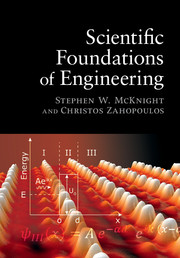Book contents
- Frontmatter
- Contents
- Introduction
- 1 Kinematics and vectors
- 2 Newton's Laws, energy, and momentum
- 3 Rotational motion
- 4 Rotation matrices
- 5 Materials properties: elasticity
- 6 Harmonic oscillation
- 7 Waves
- 8 The quantum puzzle
- 9 Quantum mechanics
- 10 Quantum electrons in atoms, molecules, and materials
- 11 Quantum electrons in solids
- 12 Thermal physics: energy, heat, and thermodynamics
- 13 Quantum statistics
- 14 Maxwell's equations and electromagnetism
- 15 Electromagnetic waves
- 16 Electromagnetic materials
- 17 Fluids
- Bibliography
- Index
9 - Quantum mechanics
Published online by Cambridge University Press: 05 September 2015
- Frontmatter
- Contents
- Introduction
- 1 Kinematics and vectors
- 2 Newton's Laws, energy, and momentum
- 3 Rotational motion
- 4 Rotation matrices
- 5 Materials properties: elasticity
- 6 Harmonic oscillation
- 7 Waves
- 8 The quantum puzzle
- 9 Quantum mechanics
- 10 Quantum electrons in atoms, molecules, and materials
- 11 Quantum electrons in solids
- 12 Thermal physics: energy, heat, and thermodynamics
- 13 Quantum statistics
- 14 Maxwell's equations and electromagnetism
- 15 Electromagnetic waves
- 16 Electromagnetic materials
- 17 Fluids
- Bibliography
- Index
Summary
The behavior of classical macroscopic particles – from baseballs to planets – is governed by Newtonian mechanics as we have described in the first chapters of this book. The behavior of very small particles, on the other hand, is governed by an entirely different collection of equations and rules that go under the name of “quantum mechanics” and these particles are referred to as quantum particles. These rules have analogies to classical mechanics, but are fundamentally different and somewhat mysterious as we discussed in Chapter 8. The fundamental principles of quantum mechanics cannot be proven to be correct. They were developed based on the results of experimental observation, by analogy with classical mechanics, and through the consideration of logical implications of the formalisms used. There is no way to derive the fundamental elements of quantum mechanics, any more than one could predict from first principles that Newtonian forces should add as vectors. On the other hand, quantum mechanics is among the most rigorously tested theories in science, and the predictions of quantum mechanics have, so far, always been in agreement with experiment. In this chapter, we will present quantum mechanics as a series of postulates and examine their implications in application to simple one-dimensional systems. In the next chapter we will examine quantum effects in real systems including atoms, molecules, crystals, and artificially engineered nano-structures.
Postulates of quantum mechanics
QM Postulate 1: A quantum particle is described by a wave function Ψ(x, y, z, t) which is a function of spatial coordinates and time. All physically determinable quantities can be derived from the wave function Ψ(x, y, z, t); quantities which cannot be found from the wave function are not physically meaningful.
Note that some things that one could ask about a quantum particle, for example the exact position and simultaneous exact momentum of a particle, are not derivable from the wave function and are therefore considered indeterminate (or uncertain). These are things which cannot ever be known about a particle, and, as such, they are meaningless to contemplate.
- Type
- Chapter
- Information
- Scientific Foundations of Engineering , pp. 148 - 171Publisher: Cambridge University PressPrint publication year: 2015



